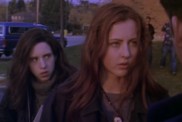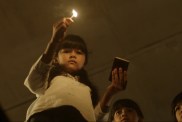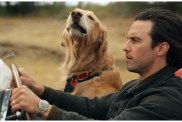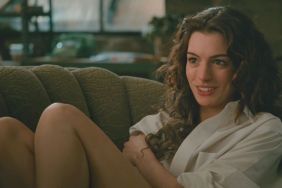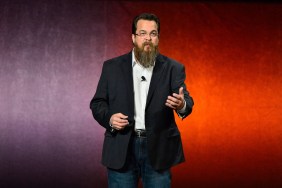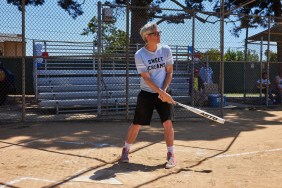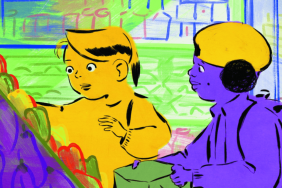
Trying to follow up the one-two punch of The Devil Wears Prada and Marley & Me must not have been an easy task for director David Frankel, but when you have two back-to-back mega-hits like those, it might not seem like that unconventional a decision to finally make a long-time passion project.
Loosely based on Mark Obmascik’s novel “The Big Year: A Tale of Man, Nature and Fowl Obsession,” The Big Year stars Jack Black, Owen Wilson and Steve Martin as avid birdwatchers from different walks of life who go on a year-long competition to see who could spot the most birds of different varieties. The competition gets fierce as it takes the three of them all across the country, friendships are formed and broken, and if you don’t walk out of the movie knowing at least three new species of bird you’d never heard of before seeing the movie, then you clearly are too busy marveling at the impressive flock of actors Frankel assembled around the trio. Even though it’s first and foremost a comedy (and how could it not be with those three?), the results are surprisingly poignant as the three men learn there are more important things to life than being the person to spot the most birds in any given year.
ComingSoon.net sat down with Frankel a few weeks back as he was taking a day off from finishing the filming of his next movie, Great Hope Springs, which reunites him with Meryl Streep, joined by Tommy Lee Jones and Steve Carell.
ComingSoon.net: I read that “The Big Year” was something you’ve been wanting to do for a while.
David Frankel: Well, people weren’t pounding down my door to make a bird watching movie, but I fell in love with the script when I read it. We were still editing “The Devil Wears Prada” and I just fell in love with this movie. I fell in love with the characters and the opportunity to tell a story in a world that was really unusual, and that’s one of the things I look for. “Prada” was in the world of fashion, and it just seemed like this was a cool other world with equally passionate and obsessive characters, and also grappling with some similar themes.
CS: Was it really obvious when you read the script how complicated it was going to be, with a lot of locations, a lot of birds you’d have to find or recreate. Was it a little better to put it off so you had a few more movies under your belt?
Frankel: Well, I certainly didn’t know how we were going to do the birds, and it was not a movie that could be done inexpensively, so we tried to find other ways that we can do this on a low budget, and there just weren’t. I wanted to work with movie stars, and I wanted to do it right. I wanted to go to as many of the locations as we could to really capture the spirit of the desert and mountains and snow and rain and the Everglades and deserts, so that was the challenge of it. Fortunately, after we made “Marley & Me,” it was Liz Gabler at Fox who sat down with Karen and me and said, “Okay, let’s give it a shot.”
CS: Was there a lot of development done during that time?
Frankel: There was some development. I worked really closely with Howard Franklin writing the script, and it evolved a lot over the years. Then it evolved a little bit more when the stars became involved, and it just kept getting deeper and richer and funnier.
CS: You had been working with Owen on another movie during that time, so did he feel the passion you had for the project and was he already interested while you were working together on that movie?
Frankel: Well, I mean, he was a little skeptical like, “What’s this bird watching movie?” He thought it was a fascinating world, but he wasn’t sure that he was right for the part even, and I felt that this is as close to Owen Wilson as he’ll ever get to playing on a film. It’s a character who’s really charismatic and really funny and yet, a little bit wily and very competitive and determined to succeed and determined to win. Owen comes across as such an easy-going, laconic figure, but he’s very competitive. It was fun to be able to see him in a role like this where he can just show up and be himself a lot.

CS: You’ve already admitted this is a strange premise for a major studio movie. Was the studio already on board before you started getting actors involved or was it having to juggle back and forth to get these actors before they agreed to make it?
Frankel: It was important to go to them and say, “Here’s the script.” They recognized that it was a great script, and I said, “I think we can put together a cast that’s going to be not just three movie stars, but we’ll also have an amazing supporting cast,” which I think we attracted, just an extraordinary collection of actors to this movie.
CS: Yeah, obviously the three guys are great, but in the supporting cast, you have a couple of award-winning actors like Dianne Wiest and Brian Dennehy…
Frankel: Anjelica Huston, Rosamund Pike, Rashida Jones, Emmy award-winning Jim Parsons, Joel McHale, Kevin Pollack, Anthony Anderson. So yeah, I think that’s a testament to the script that people were so drawn to the story and to this world. I like to think… is it an oddball movie? For sure, but the uniqueness is what makes it so appealing. When I go to the movies, I like to see something different. I’m always dying to see something different, and I think that certainly last fall during the Oscar season we saw any number of films that were surprising people. I mean, “The King’s Speech” and “True Grit” and “Black Swan” and these were all very special films. When we show the movie to people, the response is unique and special and different and that’s the thing that I appreciate most about it, that it does take you outside of the comfort zone. It takes you out just to someplace new, and you learn something as well as being entertained.
CS: Last year? This year is kind of odd when “The Lion King” is number one for two weeks, and then “Dolphin Tale.” There are a lot of movies that are not expected to be the number one for many weeks in a row.
Frankel: Sure, and I think that just shows you that the audience is really ready for new things. Hopefully, it’s an inspiring time in Hollywood where people take more chances. I mean, the trick is taking chances, but having a budget that is risky and doing it with movie stars, and a production that is expensive to take a movie company around North America is not cheap, and it had to be done for this movie.
CS: With “Prada” and “Marley,” those were both based on huge best selling books. Was “The Big Year” a book that was known at all?
Frankel: Well, it was known obviously in the bird community, and I think it had crossed over a little bit because it’s such an entertaining work of nonfiction, but not anything like the scale of “Prada” or “Marley & Me.”
CS: What are the logistics of a movie like this, especially with the locations because you have a lot of big name actors and you’re taking all over the map including the Yukon? Did you have to fudge some of the locations to make it work?
Frankel: Obviously in the course of doing “Big Year,” these guys are in all 50 states and probably travel 250,000 miles, but we were able to–I think very convincingly–we shot desert both in Joshua Tree and California and then the Okanagan Valley in British Columbia, which is the northern tip of the Rockies chain and it looks a lot like Arizona or Wyoming and New Mexico. Then, we were out in Vancouver Island in a town called Tofino, which the coastline there is a lot like the Pacific Northwest. Then, we were in Whistler, to simulate the heart of the Rockies, Colorado and Utah. We were up in the Yukon, specifically for the tundra. It’s 2,000 miles north of Vancouver, and the first time we went up there scouting last February, and it was 20 below scouting. You couldn’t get out of the van. I don’t even know why we went honestly. Google Earth would’ve been a much more efficient way to figure out where we were going, but it certainly was shocking to understand that the logistics involved in just six people getting there in a van so the challenge of getting a movie company up to the tundra and then building a set in the tundra where both the Parks Service and the peoples that control the land did not want us trampling on the tundra or doing any damage. We had to build the actual set, the Atu barracks had to be built up in the mountains, so we managed somehow to do that. We had to be there because that’s the only tundra that was even accessible to us at that time of year. Then, we shot in the Florida Everglades and down in the Keys and here in New York.

CS: That’s still a lot of locations.
Frankel: Yeah, not 50 states, but a lot of states in a lot of locations.
CS: How do you convince Steve Martin, “Hey Steve, we’re going up to the Yukon now.”
Frankel: I was nervous, believe me. The first time we met Steve he was saying, “I read the script and there’s a lot of scenes in snow and rain and it gets cold. Do I really have to go outside? I kinda like just playing a character that wears a tuxedo and stands on a soundstage.” I said, “No, it’s gonna be fun. We’ll try and make you as comfortable as possible.” But in fact, once we got out there, I mean, we shot some of the scenes at sea where the guys go out looking for seabirds, and we had to be on a boat for four days. Steve was out there in eight to 10 foot swells and doing his lines, and in the end, generally having the time of his life. The same when we went out to the Yukon. It’s the Land of the Midnight Sun. We worked a lot of hours in the course of the day, and then we’d go back. We were in this tiny town, Dawson City, and there was a saloon, and all the guys were playing Hold ‘Em until four in the morning. We’d go and play golf in the middle of the night. We just had a great time.
CS: How hard is it making a movie like this when you have three guys who are just so naturally funny? I don’t know if you saw the video for the press conference yesterday, but they were actually joking about the fact that Fox was going to get so mad because they were riffing so much, so how is it working with that?
Frankel: They’re just so crazily funny. I mean, they’re freakishly funny guys, but yet they’re really good at their jobs. They really understood their characters and they know how to make movies; they’re really experienced in it, so they would always come and deliver versions of the script as written and as planned, and then often, they would talk and they would take a few liberties. A lot of the time that ended up in the movie, too.
CS: The movie’s not as madcap as some might expect from the commercials which definitely focus more on the comedy, but it’s really a somewhat touching story about these guys’ lives, so was that something deliberate, that you wanted to keep it a little more toned down?
Frankel: I wanted to keep it toned down. I didn’t want to overdo the comedy, so that we could still get to a place where drama and emotion would feel real. It was more important to have the emotional experience of these guys and then if there were laughs to be had along the way, great, but I wanted to experience “The Big Year” and all the adventure that went along with that. At times, we make birding seem like an action chase, and it’s a lot more active in the movie than I think it is, but the emotions of the characters were the most important thing to me.
CS: Yeah, I thought you did the same with “Marley & Me,” and also with “Prada” because they were very funny movies without actually going for obvious laughs.
Frankel: Well, my experience in both of those movies, they sort of start off light-hearted and they’re clearly comedies for the first hour or so, and then once you’re fully invested in the story and the characters, the movie sort of takes a little turn to a place that’s surprisingly emotional or a little darker in the case of “Marley,” sadder and here, I think moving. I think suddenly where these guys end up is I think surprising. Certainly surprising also to see the acting and to see these stars who are known for being comics display their full acting talents and show that they can be dramatic and that they can play. I mean, there’s just a lovely scene between Jack and Brian Dennehy.
CS: Yeah, I liked those scenes a lot as well as the ones between Owen and Rosamund.
Frankel: They’re very powerful together, and it’s not at all what you expect the first time you meet Kenny Bostick, that you’re going to end up in that kitchen with him fighting with his wife.
CS: Was it very deliberate to try to keep it rated PG as well?
Frankel: Yeah, it’s not a movie about anything that is transgressive, that’s shocking or bawdy or difficult. I think on the one hand, the characters are all in their 40s, or in Steve’s case 60s, but the experience of the adventure is universal and my kids love birding, and I did want to make the film available to families if they wanted to go.

CS: But it’s not a kids’ movie, but as I was saying, there definitely seems to be an audience for movies that aren’t as edgy. It’s kind of surprising to me, ’cause I’m an edgy guy…
Frankel: No, sure, definitely. You know, it’s fascinating when we tested, and we had the same experience with “Prada” and “Marley,” people are grateful for films that, “Oh, I can bring my kids to this. Oh, I can bring my daughters to this and not stick my hand over their eyes for those few moments.” It’s kind of amazing when you look down the roster of popular films, how few opportunities there are like that.
CS: Absolutely. So you’ve already finished filming “Great Hope Springs,” your next movie?
Frankel: Close, another week and a half to go, yeah.
CS: How’s that been? You’re working with Meryl again, which I assume must be…
Frankel: Terrible.
CS: As soon as that was announced, everyone got really excited about seeing her and Steve together. Is that a little more comedic or is it still more of a drama? You read the premise and it can go either way very easily.
Frankel: Well, it’s a drama with surprising comedy, that’s the best way to describe it now. I mean, until I see it in the cutting room, but I think our take on it is that it’s really, really funny, but we’re not playing anything for laughs, and I think that’s the best kind of comedy, I think, where the humor comes out of very real emotion, not unlike “The Big Year.” I think that’s a similar tone that we’re going for in “Great Hope Springs.”
CS: It seems like a little smaller movie, but I guess compared to this movie, any movie would be a little bit smaller.
Frankel: Yeah, I’m grateful to do a smaller movie. It is much smaller. I mean, it’s a much shorter schedule. We’re shooting the whole movie in seven weeks. I think “Big Year” was closer to 12 weeks, so it’s definitely more contained. A lot of it is sitting in therapy with Steve Carell as the therapist, but they’re all remarkable.
CS: Steve is the therapist?
Frankel: Steve’s the therapist, yeah.
CS: Who’s the husband then?
Frankel: Tommy Lee Jones.
CS: Oh nice, okay, wow. That’s an interesting dynamic.
Frankel: Yeah, a really interesting dynamic.
The Big Year opens nationwide on Friday, October 14.

